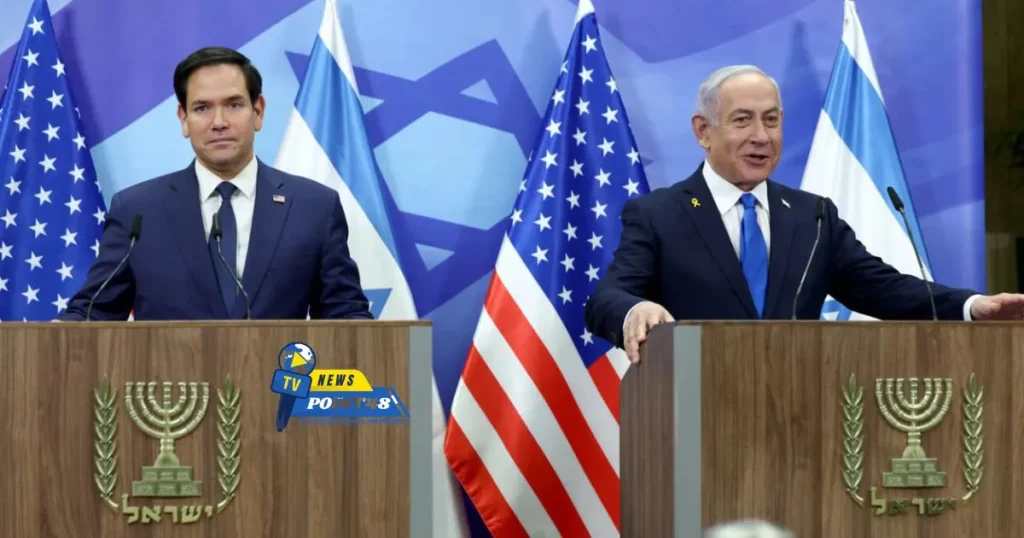
A tentative peace between Israel and Hamas is once more under question as U.S. Secretary of State Marco Rubiocontinues his descent into line with the more hardline Israeli Prime Minister Benjamin Netanyahu on Hamas. It would also bring a new sense of doubt about the sustainability of the truce and the fate of Gaza.
U.S. Support of Israel’s Goals
Secretary Rubio, during a visit to Jerusalem in the past week, was crystal clear in support of the steps Israel must take to eliminate Hamas’s presence in Gaza. He said that Hamas has to be destroyed, both as a military force and as a governing force, before the region can achieve lasting peace and safety. “Hamas can no longer govern the Gaza Strip, neither as a civil administration nor as an armed power, and must be eliminated,” Rubio said.
The stance essentially signals a strong U.S.-Israel alliance. It implies that a more hawkish approach of avoiding diplomatic negotiations in favor of military solutions is likely the agenda’s focus moving forward. The U.S. administration’s position has raised questions about whether the current ceasefire, which was first brokered with the help of Egypt, would be sustainable as a lasting truce.
Ceasefire Under Strain
The ceasefire, on its 42nd day, was intended to end hostilities and promote the exchange of hostages and prisoners. Progress, though, has been slow, and Hamas recently freed three Israeli hostages for a handful of Palestinians. Bargaining for the release of the other 73 hostages has broken down, with both sides accusing each other of ceasefire violations. Hamas has accused Israel of stalling negotiations, while Israel maintains that Hamas is using the truce to regroup and rearm.
This was not the first time tensions reached a tipping point during the truce, which has been repeatedly tested in recent weeks as Israeli forces carried out operations in Gaza that killed two Hamas police officers. These incidents highlight the tenuousness of the cease-fire and the obstacles to getting to peace in the face of deep distrust.
Debated Resettlement Plans

Complicating matters further, Prime Minister Netanyahu has indicated his support for a so-called U.S. plan to resettle Palestinians from Gaza in other countries. Endorsed by President Donald Trump, this proposal transfers the population of Gaza to facilitate redevelopment and security. He said it was the only solution that made sense for the future of the region.
However, the plan has been met with widespread condemnation from Arab nations and international organizations. Leaders in the United Arab Emirates and Saudi Arabia have expressed intense opposition, insisting that mass displacement would violate international law and would be destabilizing for the region. Egypt is working on a counterproposal centered around reconstructing Gaza without enforced relocations, which we know is also not only about Gaza reconstruction but the future of the Palestinian people and the entitlement to their rights.
Regional Implications
The U.S. administration’s consistent endorsement of Israel’s hard-line posture has far-reaching consequences for regional stability. Secretary Rubio’s tour of the Middle East is intended to rally regional support among Arab states for a post-conflict plan that serves U.S. interests. But the resettlement proposal and any potential resumption of military operations have marred relations with crucial allies, who are concerned that those actions might induce new unrest and a humanitarian crisis.
The MK-84 bombs recently shipped from the U.S. to Israel come as the two nations are upping military cooperation. The deployment is seen as a demonstration of the willingness to ramp up military operations in Gaza if Hamas fails to comply with calls for the immediate, unconditional release of all hostages. Hamas’s hostage situation has become an increasingly tense flashpoint as Netanyahu threatens to “open the gates of hell” on Hamas unless the armed group releases the hostages it is holding.
Conclusion
U.S. and Israeli policies toward a more hawkish stance against Hamas have converged, which puts the current ceasefire at risk. The approval of contentious resettlement projects and the prospect of renewed military action are adding to an increasingly explosive tinderbox. With talks breaking down and tensions rising across the region, the chance for a resolution that ends the humanitarian crisis now seems both distant and growing more so, highlighting the increasingly complicated web of military strategy, diplomatic positioning, and human suffering in the search for peace in the region.

No Comments
Hello,
I came across “revew”, perhaps misspelled? spellradar.com usually helps me quickly verify.
Regards,
Your comment is awaiting moderation.Michael Gonzalez